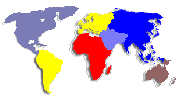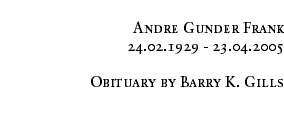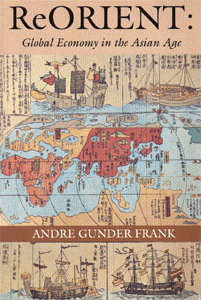|

Provincializing Europe and Rescaling the World System:
Andre Gunder Frank and a Globalist Perspective on the World Economy
by Lei Guang / Department of Political Science, San Diego State University
Andre Gunder Frank is an icon and iconoclast combined in one. Thirty five years ago, with his pathbreaking 1966 essay entitled "The Development of Underdevelopment," Frank helped to initiate a radical research agenda that came to be known as the dependency perspective on international political economy. > His prolific contributions to the dependency school made him one of the icons in radical development studies around the world. With his new book, »Re-Orient«, Frank is again charting a new territory, this time challenging his friends and foes alike, including the former Frank himself, to think beyond narrow Eurocentric approaches to the vicissitudes of world economic change and continuity.
The book is iconoclast to its core. It takes on the entire tradition of modern historiography, western and non-western, left and right, on the world economy. Among the revered icons he attempted to knock down in his new book are Karl Marx, Max Weber, Karl Polayni, Talcott Parsons, Arnold Toynbee, Charles Kindleberger, Fernand Braudel, Immanuel Wallerstein and »most other contemporary social theorists« (p.xvi) such as Perry Anderson and Benjamine Barber on the left and W. W. Rostow, Samuel Huntington and Francis Fukuyama on the right. (p.xvi)
The thesis of the Re-Orient is quite straightforward: a truly global perspective is needed in studying macro-historical changes in the world – the rise and fall of empires, the industrial revolution, the decline of the East and the corresponding rise of the West, colonialism in India and American revolution, etc. The whole is greater than the sum of its parts, as Frank repeatedly tells us in his book, the parts can only be understood in relation to the whole. Adopting such a globalist perspective is no easy task, however, as most of our contemporary social science, history included, is trapped in an Eurocentric ideology masquarading as universal science. Frank sets out to debunk this Eurocentric myth by marshalling an impressive array of evidence, mostly from secondary literature, that suggests the dominance of Asia (mainly Ming and Qing China and Mughal India) in an interconnected world economy from 1400 to 1800. According to Frank, Europe was only a marginal player in global trade and production during the early modern period. It remained economic backwaters compared to a more productive and expansive Asia till 1800 when a number of conjunctural factors, including global economic contraction and European access to American silver, led to Europe's surpassing the East in its industrial capacity. Frank stressed that nothing extraordinary or transformative (e.g. Industrial revolution, the emergence of modern state system, or capitalist reorganization of European economy, etc.) from within Europe finally led to its rise. Rather, cyclical change in the global economy plus serendipity (Europe's chance upon American silver and gold) explains it.
Gunder Frank was invited to the San Diego State University by historian Ross Dunn for an event associated with the World History Association in late March this year. I had the opportunity to talk to him and to invite him to my graduate seminar on »international political economy« on March 30. When I approached him about the seminar, he immediately had problem with the word »international« in the title of the course, as he believes (rightly so) that it presumes the prior existence of »nation-states« and takes them as the basic units of analysis. I told him I was not responsible for the course title, so he »grudgingly« agreed to speak to my class and answer questions about his book.
Exchange with Frank was both frustrating and exhilarating. He has the uncanny ability of turning the table on his questioners and then offering a lucid account of his own interpretation of world history over the millennium. He is firm in his sharp and sweeping criticisms of Eurocentric ideology and yet remains tentative with his own global, humanocentric perspective. In fact he seemed a little offended when we questioned him about his »alternative theory« in place of Eurocentric models. He said he did not intend to offer any »theory« in his book. He merely wanted to use the tools already available to analyze the real world (as opposed to the fictionalized world in Eurocentric historiography). Elsewhere in his book, he also stressed the »preliminary« nature of his inquiry (p.341). According to him, a truly globalist perspective on world history would need to stand on a three-legged stool encompassing ecological / economic / technological analysis as well as the study of political/military power and social/cultural/ideological dimensions. In this book, he said, he only succeeded in focusing on half a leg. The modesty of his claim notwithstanding, his biggest contribution, it seems to me, rests in two areas: provincializing Europe and scaling up the world system.
Provincializing Europe:
Samir Amin once wrote that Eurocentrism is not simply the sum of all the prejudices, errors and blunders of Westerners with respect to other peoples. »If that were the case,« he said, »it would only be one of the banal forms of ethnocentrism shared by all peoples at all times.« To both Amin and Frank, Eurocentrism is a knowledge system that is historically specific and is rooted in particular configurations of power and material interests. Eurocentric thinking attributes to the West an almost providential sense of historical destiny, manifested in its continuous advances in science, technology, industrialism, rationality and economic institutions from time immemorial. It takes European experience as universal and envisions the world from a single privileged point that is Europe. The world is thus bifurcated into the West and the Rest, and a system of knowledge is constructed around a series of binary hierarchies with Europe invariably occupying the higher position: Western nation, non-western tribe; western religion, non-western superstition; western capitalism, non-western petty commodity production; western technology, non-western craftsmanship; western progress, non-western stagnation, so on and so forth.
Frank's book is aimed at debunking such Eurocentric myths organized around these binary constructions. The main culprits, Frank found, were the 19th century European historians, chief among whom were Marx and Weber. Frank agreed with Braudel`s observation that »Europeans invested historians and then made good use of them.« (p.2) In this regard, what Frank attempted to do in his book is quite similar to what Edward Said tried to do many years ago with his devastating critique of Orientalism. Only this time, Frank is focusing on the historical discourse on political economy and is bent on demonstrating the »falsehood« of conventional claims by checking them against »facts«. Frank is no constructionist or post-modernist who takes »knowledge« or »discourse« as proper object of analysis. He insists on the materiality of a world system. He would, as he did at a dinner-table conversation at SDSU, challenge anyone to come up with one single »idea« that has changed the world. Unlike Said who was interested in tying knowledge to power, Frank wanted to suggest that »true« knowledge can emerge if only one take a careful look at the »empirics« and adopt a truly global perspective on the world system.
To Frank, a truly global perspective means to put Europe in its rightful, provincial status. Europe was but one part of a world-encompassing system of political economy, and its fortune was tied to the cyclical changes that would bedevil the system every half millennium. There was no European exceptionalism. Neither capitalism (cf. Marx), nor Protestant ethic or modern bureaucracy (cf. Weber), nor the Westphalian state system (cf. almost all contemporary IR scholars) explains Europe`s post-1800 rise and the shape of modern world system. In class, Frank talked about abandoning altogether such notions as »capitalism«, »class«, »mode of production« and »feudalism« and »inter-state system«. Globalism, not capitalism, has been with us all along, according to Frank. As a result, explanations of Europe`s rise and concomitant changes in the world system should be turned upside down. It is global systemic changes, with its center of dynamism located in Asia in the early modern days, that led to the evolution of European institutions. The trading of places between the East and West was merely the latest continental shift of fortune in the existing world system. In Frank`s favorable metaphor, the provincial Europe »did not pull itself up by its own economic bootstraps...« Rather it »climbed up on the back of Asia, then stood on Asian shoulders – temporarily.« (pp.4-5)
Frank argues that going beyond Eurocentrism does not mean to return to Asian-centrism (e.g. sino-centrism or indocentrism), or Afro-centrism or any other form of ethnocentrism. Other forms of ethnocentrism, according to Frank, is only less harmful than Eurocentrism because they are not as powerfully imposed on the people around the world. But they are just as incomplete or incorrect as Eurocentric perspectives on history and global change. Frank`s globalist vision would entail a »telescopic perspective capable of encompassing the whole world and all its parts...« (p.338). His Archimedean point, that there is one for him sets himself apart from postmodernists, for explaining the vicissitudes of human history lies not within provincial Europe, Asia or Africa but in various points of connection outside of the regions, or in Frank`s word, nodes of »horizontal integration«.
Rescaling the world system:
For Frank, abandoning Eurocentric provincialism and adopting a global perspective mean that we have to re-scale the »world system« to make it a truly all-encompassing global system. His attempt to up-scale the »world system« led to his unstinting critique of Wallerstein`s world system analysis as Eurocentric. Frank argued, indirectly in Re-Orient and more directly in an earlier work The World System: Five Hundred or Five Thousand Years, that a spatially and historically continuous world system has been with us for 5000 years rather than 500 years as conventionally argued by the world system theorists. Capital accumulation, trade and growth, according to Frank, have existed well before the modern period as well as outside of the West. We would be wrong if we think that Frank merely tried to extrapolate Wallerstein`s analysis back in time and cast it in a wider geographical context encompassing the entire world. Such »extrapolation« is no mere extension in time and space. It sets him off on an intellectual path from which he could challenge core Eurocentric assumptions underlying conventional world system theory. As Frank emphatically put it, »the world system was not born in 1500; it did not arise in Europe; and it is not distinctly capitalist«. Frank`s »world system« is not only pre-modern and pre-European, but it conditioned the rise and decline of sub-systemic economies. The causal arrow flows from the system to the parts, not the other way around.
His materialism notwithstanding, Frank mounted a sharp criticism of orthodox Marxism for its Eurocentric bias and historical »stagism«. He rejected the view, on this he was in agreement with Wallersteinian world system theorists, that history is a series of transitions from one mode of production to another. Rather, he believed in a cyclical view of history based on »world market competitive pressure and exigencies« (p..331). He also rejected the position, on this he differed from conventional world system theorists, that there was a qualitative break in 1492 which launched the modern world system centering around European capitalism. Instead, he argued that trade and capital accumulation based on trade have always been an integral part of the global economy and that competition generated by supply and demand pressures forms the micro-foundation of politico-economic change. For both of these claims – in his privileging of trade as the foundation of capitalism, and in his extending of market rationality back in time to pre-modern and even earlier period – Frank will surely be accused by some Marxists as being neo-Smithian.
That would be unfortunate, Frank would suggest, because such charges would only make sense in an Eurocentric ideology, not in the real world we live in. (At one point in class he mentioned that, insofar as apportioning weight to trade or production goes, there is much more in common between him and Robert Brenner than commonly perceived. In fact he proposed to Brenner many years ago that they should co-author an article on neo-Smithianism and Marxism just to confound their critics!)
Gunder Frank defies pigeon-holing in conventional ideological or disciplinary categories. As a historian, he holds little respect for the discipline and moves back and forth between sociology, economics, politics and history. He even disdains archival research, the sacred cow of historians. If you think he is a quasi-, neo-, or revisionist Marxist, he would tell you Marxists have gotten the world history all wrong, Marx himself included. A world system theorist? Not quite so. He reserves some of his most biting criticisms for Braudel and Wallerstein. He even criticizes his past self who penned those by now famous essays on dependency and underdevelopment. A post-colonial scholar in the tradition of Edward Said? He probably would tell Said what the latter has called the Orientalist discourse is not really that important after all. To the less subtle post-modernists, he is likely to repeat the famous Clinton line: »It`s the economy, stupid.« Any ready-made ideological categories – left and right in today`s world – would seem like procrustean beds for him. In this sense, we will simply have to accept him as Frank – a Frank who always pushes intellectual and ideological envelop and instill new thoughts and lay out new paradigms for the next generation of scholars.
Some questions:
Finally I wish to end this commentary with some questions/critiques about Re-Orient. Frank has anticipated all the questions below in his book, but nevertheless has not provided satisfactory answers to them. As a result, his excellent criticisms of received wisdom is not matched by clearly-delineated model of explanation beyond the call for global humano-centric perspectives on world history. It may not be his intention at all to set up an alternative theory or model (as he himself intimated in my class) in this very book, but he did call for an »alternative, more realistic« and »more holistic global social theory« that would overcome Eurocentrism (p.322).
The first question is whether Frank`s is a structural or conjunctural analysis. This is not an either-or question, but one ought to be clear about the causal model operating in Frank`s framework. A structural analysis holds the structure – in this case the world economy – as embedding the ultimate causal power that sets everything in motion. Everything else is a derivative of that structure. Frank has strongly suggested that his is a structural analysis. A conjunctural analysis, on the other hand, may take seriously the enabling and constraining conditions of the structure, but would attribute change to the simultaneous occurrences of multiple factors that may not all be entailed by the overarching structure. The causal claim is much weaker in the case of a conjunctural analysis. Frank has alluded to numerous such factors, such as demographic change and micro-economic variables like price, wage and capital stock in his explanation of the »temporary« rise of the West. As Frank has pointed out in class, and this reviewer whole-heartedly agrees, structural and conjunctural analyses are not mutually exclusive, since the uneven structure changes through conjunctural factors. But how does one specify what conjunctural factors are causally significant for systemic change? Frank did not provide a clear answer to this question.
My second question relates to the role of institutions – institutions like the »state« and the »market« Where would they fit in Frank`s globalist approach? On the one hand, Frank seems to reject any autonomous role of institutions in socio-political change. Institutions are only derivative and facultative, not determinative of change, as Frank asserted in his book. On the other hand, we are also led to believe that the America`s money, extracted by the Europeans on the strength of mercantilist states, played a key, if fortuitous, role in the rise of the West. Isn`t the modern state system, which happened to consolidate first in Western Europe, part of the story of the rise of the West? How does the state matter? Or to pose the same question in terms of another powerful institution – the academia. As Frank rightly asserted, history as an academic discipline is largely responsible for producing and disseminating the Eurocentric ideology. Frank`s book itself can be read as an intervention with the aim of shaping the institutional culture. If institutions like the academia do not matter, why write such a book? If they do, where do institutions fit in Frank`s globalist framework?
Finally, a question not unrelated to the first one: if global structure is so confining, where do we locate possibilities of change? Is accident (such as Europeans` stumbling upon American silver) the only way? What is the role of human agency? Marx remarked that men make their own history, but not in conditions of their own choosing. We all accept that structural conditions are constraining and have to be taken seriously, but we equally believe that men »make« their history. Frank himself alluded to this question when he stated that, in anticipation of feminist criticisms, that his theory does not deal with women per se, nor with men for that matter. Indeed, he wrote that »this structural analysis does not seem to deal with any people at all« (p.40). To be fair to Frank, he did not intend his structural approach to preclude an analysis of world history focusing on human agency. He certainly did not allege that his »objective« studies of the global system leave no room for individual, community, cultural, political, or similarly »subjective« processes. But how could a structuralist incorporate such »subjective« processes, while at the same time not vitiate any claim about the efficacy of structure?
In sum, Frank`s book raises more questions than it answers. But one thing that is not under question is its provocative effect on our thinking. It challenges us to innovate our approach, to contextualize our analysis and to think beyond conventional social science and ideological categories centering around the European experience. The world is one, toward which we need to re-orient our thinking, away from its constituent parts.
Lei Guang
Department of Political Science
San Diego State University
001619-594-4942
|




